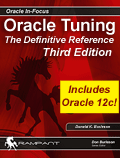 |
|
Oracle 11g changes to Optimal
Flexible Architecture (OFA)
standard
Oracle11g Tips by Burleson Consulting |
Oracle's Optimal
Flexible Architecture (OFA) is a great way to apply standards and
best practices for a large Oracle shop, especially those who must
manage multiple databases in many environments.
See this link for a full copy of
Oracle's Optimal Flexible Architecture (OFA) standard.
The
11g New Features Guide notes important OFA changes, namely the
removal of $ORACLE_HOME as an anchor for diagnostic and alert files:
"The database installation
process has been redesigned to be based on the ORACLE_BASE
environment variable. Until now, setting this variable has been
optional and the only required variable has been ORACLE_HOME.
With this feature,
ORACLE_BASE is the only required input, and the ORACLE_HOME
setting will be derived from ORACLE_BASE."
Let's take a look
at changes to the Oracle11g OFA standard.
Enter new admin subdirectories
New in Oracle 11g
we see the new ADR (Automatic Diagnostic Repository) and Incident
Packaging System, all designed to allow quick access to alert and
diagnostic information.
The new
$ADR_HOME directory is located by default at
$ORACLE_BASE/diag, with the directories for each instance at
$ORACLE_HOME/diag/$ORACLE_SID, at the same level as the
traditional bdump, udump and cdump directories and the
initialization parameters background_dump_dest and
user_dump_dest are deprecated in 11g.
You can use the
new initialization parameter diagnostic_dest to specify an
alternative location for the diag directory contents.
In 11g, each
$ORACLE_HOME/diag/$ORACLE_SID directory may contain these new
directories:
-
alert
- A new alert directory for the plain text and XML versions of
the alert log.
-
incident
- A new directory for the incident packaging software.
-
incpkg
- A directory for packaging an incident into a bundle.
-
trace
- A replacement for the ancient background dump (bdump) and user
dump (udump) destinations.
-
cdump
- The old core dump directory retains it's 10g name.
Let's see how the 11g alert log has changed.
Alert log changes in 11g
Oracle now writes
two alert logs, the traditional alert log in plain text plus a new
XML formatted alert.log which is named as log.xml.
Prior to Oracle
11g, the alert log resided in
$ORACLE_HOME/admin/$ORACLE_SID/bdump directory, but it now
resides in the $ORACLE_BASE/diag/$ORACLE_SID directory.
Fortunately, you
can re-set it to the 10g and previous location by specifying the
BDUMP location for the diagnostic_dest parameter.
But best of all,
you no longer require server access to see your alert log since it
is now accessible via standard SQL using the new v$diag_info view:
select name, value from v$diag_info.
For complete
details, see MOSC Note:438148.1 - "Finding alert.log file in
11g".
NOTE: Rampant author Laurent Schneider has some additional insight
into
creating an Oracle Automatic Diagnostic Repository (ADR).
 |
If you like Oracle tuning, you may enjoy my new book "Oracle
Tuning: The Definitive Reference", over 900 pages
of BC's favorite tuning tips & scripts.
You can buy it direct from the publisher for 30%-off and get
instant access to the code depot of Oracle tuning scripts. |
|
